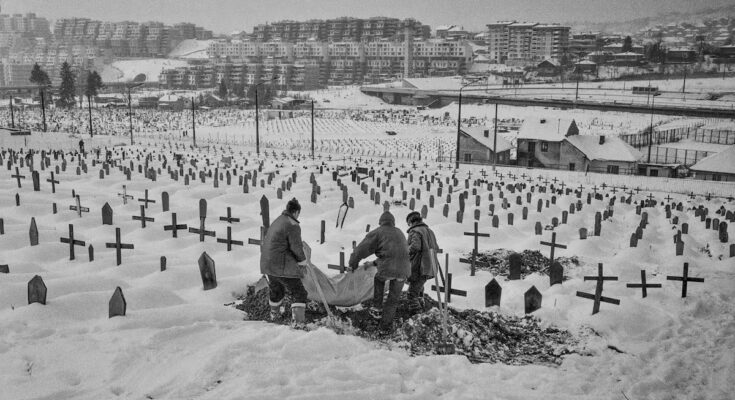The Clinton administration’s envoy to the Balkans, the famous Richard Holbrooke, was an intransigent. Exactly 30 years ago, the world watched helplessly as the bloodiest war raged in the former Yugoslavia: 100,000 dead in a conflict that pitted Bosnians, Croats and Bosnian Serbs against each other from 1992 to 1995. Holbrooke took three leaders – delegates from the three warring communities – to Wright-Patterson Air Force Base in Dayton, Ohio. The location was not chosen randomly: it was far from media and political pressure, more than 400 miles from Washington and about 5,000 miles from Sarajevo, the Bosnian capital.
Holbrooke said he needed a place where “no one could escape.” And this is where, on November 1, 1995, Alija Izetbegovic, president of Bosnia-Herzegovina, Slobodan Milosevic, president of Serbia – representing the interests of the Bosnian Serbs – and Franjo Tudjman, president of Croatia, entered the equation. “The negotiations were at once intellectual and physical, abstract and personal, something like a combination of chess and mountain climbing,” Holbrooke recounted in his book, To end a war. The three leaders left the military base on November 21st with the agreement in hand, a pact that was solemnly signed on December 14th in Paris. And it left no one satisfied.
Tudjman died of cancer in 1999, Izetbegovic of cardiovascular disease in 2003, Milosevic of a heart attack in his cell in The Hague in 2006 and mediator Holbrooke in 2010 after an aortic dissection. The pact remains in force, albeit in poor health.
A Constitution was forged in Dayton that is almost a work of engineering, shaping a state with two entities: the Federation of Bosnia and Herzegovina (FBiH), mainly Bosnian and Croatian, comprising 51% of the territory and divided into 10 autonomous cantons; and Republika Srpska, with a Serb majority and comprising 49% of the territory. Subsequently, the Brčko District was added to these entities, under joint administration and international supervision.

The country has a tripartite presidency and remains under the supervision of the Office of the High Representative (OHR). This position, held since 2021 by the German politician Christian Schmidt, has had the so-called “Bonn powers” since 1997. These powers allow the OHR to impose laws when local parties are unable or unwilling to act, to remove elected officials, or even ban certain people from holding public office for life.
The Dayton Accords have been criticized for many reasons: for creating a slow, complex and often inefficient political system, for relying too heavily on international oversight, and for entrenching divisions between ethnic groups. But there are also those who defend them. This is the case of journalist Haris Imamovic, 36, who explains on the phone from Sarajevo that this country of 3.5 million inhabitants has seen great progress since 1995: “At the end of the 90s you couldn’t travel safely in the country. And 10 years later you could move freely. There are interactions between Bosnians and Croats. Even between Serbs.”
Regarding the excess of bureaucracy, agencies and officials, Imamovic underlines: “It’s true, there are many. But the biggest problems of daily life – health, education and security – ultimately fall to the local authorities of the cantons.” The journalist, who worked for four years in the country’s presidential office, notes: “Dayton tends to get blamed for everything. But the truth is that the country’s biggest problems are the depopulation of rural areas and unemployment. And it’s not Dayton’s fault, because it happens in the rest of the Balkan countries too.”
The Dayton Accords are often cited whenever a hard-to-resolve conflict erupts, such as the invasion of Ukraine or the Gaza war. Mira Milosevich, senior researcher for the Balkans at the Royal Elcano Institute in Spain, warns that the wars are similar only on a tactical level and do not always offer valuable lessons. But he explains that the agreements demonstrate “the enormous ability of the United States to force representatives to negotiate.” He also points to another lesson from those agreements: the recognition of conquered territories. “30% of the Serbian population who conquered 49% of Bosnian territory was recognized.”
Milosevich concludes that Dayton’s greatest success was the achievement of this “frozen peace.” “Bosnia has not made progress in democratizing its institutions. It is difficult to do so when Republika Srpska continues to look towards Serbia and the Bosnian Croat Federation towards the European Union.” The researcher believes that the country and the Balkans will be reborn only “when there is a generational change”.
Florian Bieber, professor of South-East European studies at the University of Graz in Austria, believes the country’s biggest challenge now is to reform the Constitution to make it compatible with EU membership, which Bosnia and Herzegovina is pursuing. Bieber explains that the last “serious attempt” to reform the Constitution dates back to 2006 and failed by just two votes in parliament.
Bieber believes that one of the biggest obstacles, “although not the only one”, to the reform of the Constitution is the presence of the pro-Russian leader Milorad Dodik, president of Republika Srpska for the last 15 years. Dodik had repeatedly threatened to unite Republika Srpska with Serbia. On 1 August he was sentenced to a six-year ban from holding political office for disobeying the rulings of the Constitutional Court of Bosnia and Herzegovina and High Representative Schmidt.
“Dodik is clearly determined to rule from behind the scenes,” warns Bieber. “He appears to be relying on running Republika Srpska through figureheads, which makes any change unlikely.” The second major challenge is the dominant Croatian party’s demand for greater protection of Croat rights, something the Bosnian majority rejects as it reinforces ethnic divisions.
Bosnian Serb analyst Tanja Topic complains that in the wake of Dayton, a wealthy political class emerged which, for three decades, consolidated the country’s ethnic and nationalist structure. These leaders keep the country trapped in a war of words, employing inflammatory rhetoric. Topic criticizes parties for blocking reforms by prioritizing personal interests and for using the High Representative as an excuse for inaction. The analyst acknowledges that Dayton ended the war, but warns that it also strengthened ethnic divisions and a corrupt, cronyist and nepotistic political system.
Topic believes that the rule of law is “an unattainable dream” in Bosnia and Herzegovina. “It is necessary to reboot the entire society and try to change the paradigm of values. And this is a process that could take another three decades,” he concludes.
Sign up to our weekly newsletter to get more English-language news coverage from EL PAÍS USA Edition



